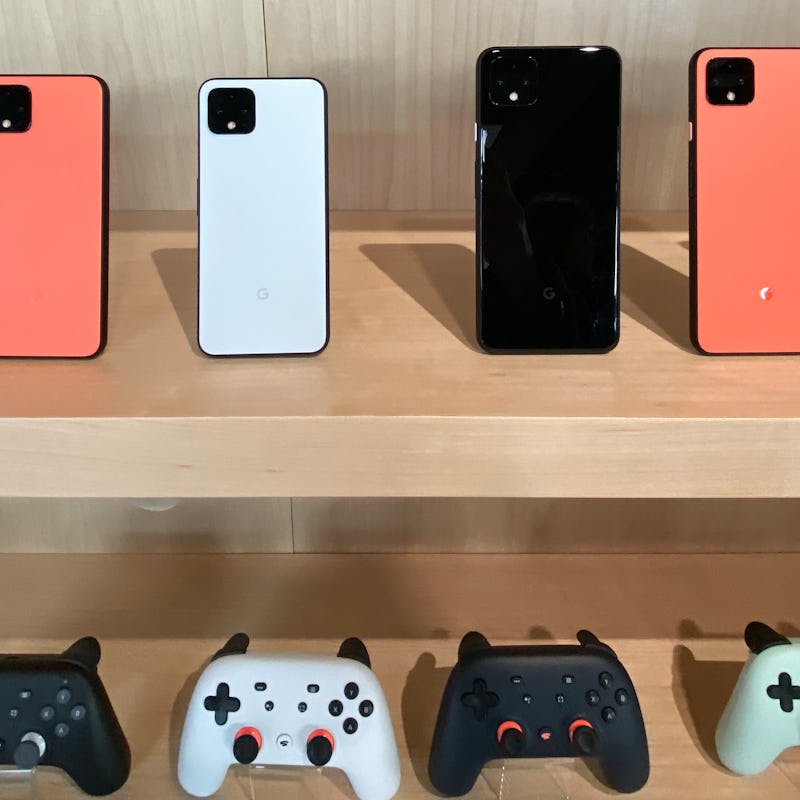Google’s Pixel 4 event brought no surprises (and that’s okay)
But that Recorder app is a low-key game changer

We knew exactly what to expect going into Google’s fall event — tireless leakers made sure of that in the months leading up. Just about every detail of the Pixel 4 emerged online ahead of time, leaving no table unturned, at least in the way of hardware.
By the time Google actually unveiled the Pixel 4 and Pixel 4 XL, its newest smartphone already felt pretty familiar. A new shade of orange (arguably more salmon than true orange)? Check. Two size options with matching specs? Check. The “camera square” and a shift away from the widely-panned “notch”? You bet.
But, smartphone hardware wasn’t the most exciting thing Google had to show off, anyway. The company dropped a ton of announcements and upgrades to its family of devices, including the next generation of Pixel Buds, an impressive Recorder app that can transcribe audio in real-time, and a more affordable addition to the Chromebook family, the Pixelbook Go. Notably, Stadia also finally has a launch date: November 19.
Input is a new kind of tech publication launching in the fall. We’re dedicated to bringing you a fresh perspective on the devices, creators, trends, and ideas that are changing our world. You can follow Input on Twitter @inputmag and Instagram @input. Sign up to receive our newsletter here.
Google kicked off its event in New York City by diving straight into its vision for entertainment, the smart home, and “ambient computing” — the always-listening, theoretically always-helping network of devices powered by Google Assistant.
The major takeaways
The latest Pixel Buds
Pixel Buds: Google’s answer to AirPods will cost $179 with the wireless charging case and come in four colors: green, orange, black, and white. But, they won’t be available until spring 2020, which is a shame. While Pixel Buds don’t appear to be noise-canceling, they’ll use adaptive sound technology to adjust the volume according to your surroundings. Google says its earbuds support 5 hours of continuous listening time, which bumps up to 24 hours when paired with the wireless charging case.
Stadia: Google’s gaming service will be ready to play starting November 19 with 40 games at launch. You’ll have to purchase the $129.99 Founder’s Edition to try it in the first wave, though. Founder’s Edition buyers can then sign up for Stadia Pro at $9.99 per month. The rest will have to wait for 2020 when the Base package becomes available.
Nest: Google made a slew of Nest-focused smart home announcements, including the unveiling of a new subscription model that could make home surveillance much more affordable. Nest Aware will allow users to pay a flat rate for all of their compatible devices instead of the per-camera basis of the past. There will be two plans: Nest Aware at $6 per month for 30 days of event video history or Nest Aware Plus for $12 per month, which covers 60 days of event video history and 10 days of around-the-clock video history. Google also took the wraps off the $49 new Nest Mini, which packs double the bass and improved Assistant, and the Nest Wifi router, starting at $169.
Google's new Nest Mini devices
Pixelbook Go: Google’s new laptop is much cheaper than its predecessors, starting at just $649. It has a 13.3-inch touchscreen and introduces a new grooved base, which Google says will make for a better grip. It comes in two colors (Just Black and Not Pink) and can run for up to 12 hours on a charge. According to Google, even 20 minutes of charging will get you about 2 hours of use.
Pixel 4 and Pixel 4 XL: The event gave us a good look at some of the camera features as well as improvements to speech and facial recognition. Pixel 4 essentially packs a “miniaturized camera rig right on the back of your phone,” Google says, and features such as enhanced Night Mode and Live HDR+ make the most of machine learning to improve white balancing, portraits, and low-light shots. The new Pixel comes with either a 5.7- or 6.3-inch display and starts at $799.
A few wows and some “wait…what?” moments:
Google dedicated much of its presentation to Pixel 4’s souped-up camera, which at first glance is undeniably impressive. The company even invited legendary portrait photographer Annie Leibovitz to the stage to discuss her hands-on work with the smartphone. It’s touted to have the best built-in camera on the market today and packs several improvements to take your photos to the next level — which made the photographer’s lackluster praise all the more confusing.
When asked to share some pro-tips with the audience, Leibovitz said: “It’s all inside you. Just go out and do it, it’s all there.”
Thanks for the… um…advice? The photographer did, however, also note that she thinks it’s “really great that this is available for everyone to use.”
“It was a little bit of a rough start and then I just relaxed and really, totally enjoyed myself,” Leibovitz said of her own experience using the smartphone camera.
Photographer Annie Leibovitz on stage during the Google event
Some of the most noteworthy announcements of the event stemmed from what are arguably the most boring features — as in, the ones you’ll actually use. Google’s Recorder app is a standout; even in the crowded press area loaded with background noise, it was able to transcribe audio in real-time precisely. For a reporter, students, or anyone who prefers to dictate notes and lectures, for example, this feature could be a dream.
And, while the first iteration fell flat, Apple may actually have real competition on its hands with Google’s cute new Pixel Buds. They’re small and seem to fit more comfortably in the ear, and could crush AirPods in the battery-life department. By the time they actually hit the shelves, though, who knows what Pixel Buds will be up against.